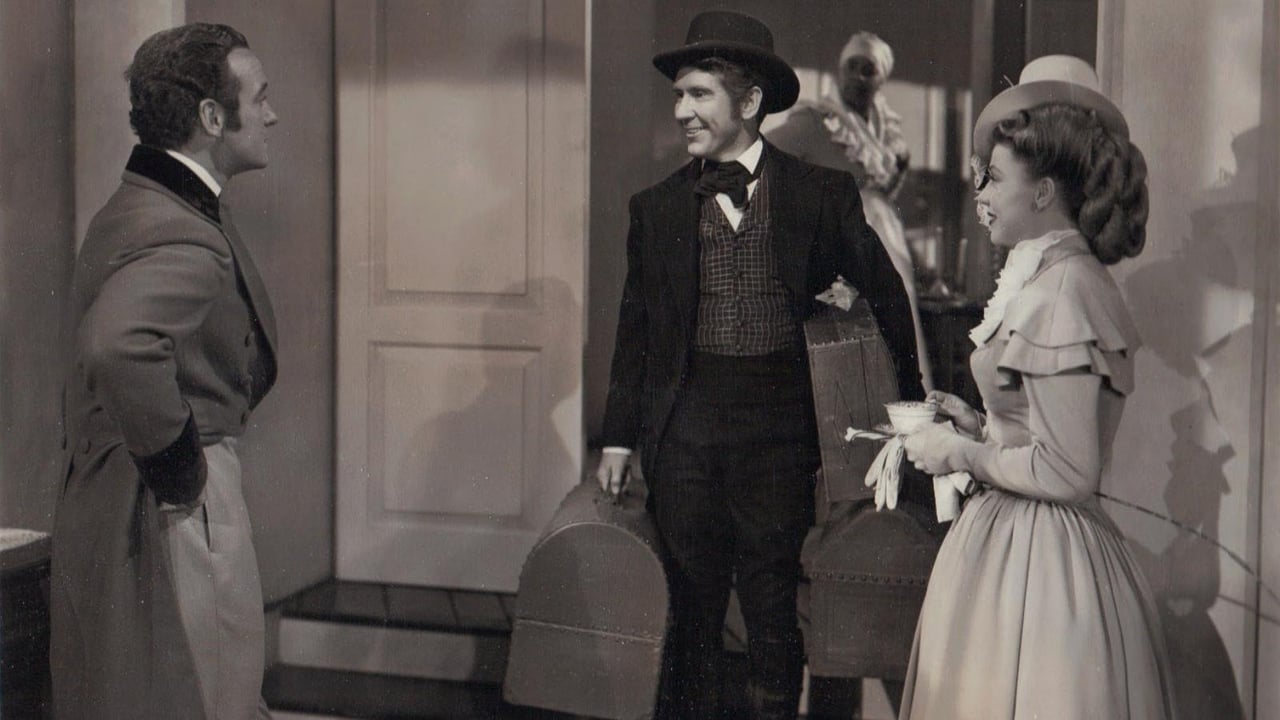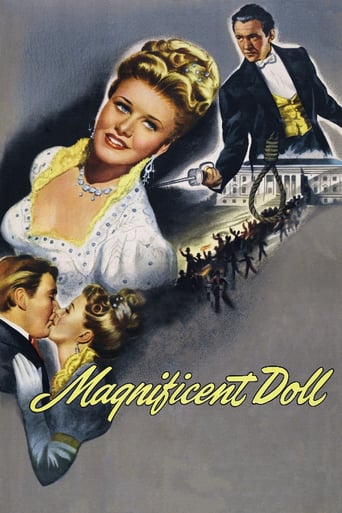Thehibikiew
Not even bad in a good way
CrawlerChunky
In truth, there is barely enough story here to make a film.
Mehdi Hoffman
There's a more than satisfactory amount of boom-boom in the movie's trim running time.
Staci Frederick
Blistering performances.
JohnHowardReid
Producers: Jack H. Skirball and Bruce Manning. Copyright 9 December 1946 by Hallmark Productions, Inc. A Jack H. Skirball-Bruce Manning production, released through Universal-International. New York opening at Loew's Criterion: 7 December 1946. U.S. release: November 1946. U.K. release: 5 May 1947. Australian release: 29 May 1947. 8,710 feet. 96½ minutes. Australian release title: MAGNIFICENT LADY.SYNOPSIS: Quaker's daughter, forced into an unwilling marriage, is freed by the death of her husband to pursue political ambitions in Philadelphia. Time: around 1790-1814.COMMENT: The stills from the film look great - Ginger, radiant in lavish period costumes with feathered hats, set against colorful backgrounds crowded with picturesque props - but the film itself is something of a disappointment. Borzage's slow, turgid direction does nothing to enliven Irving Stone's embarrassingly pedestrian script which reduces the sweep of major historical events to common¬place domesticities. Mind you, we should be grateful - for the one time Mr Stone attempts to demonstrate the sterner facts of Constitutional freedom, he veers into unintended parody.Nonetheless, despite the handicaps of unsympathetic direction and a soap-operettish script, the players manage to provide some measure of interest. Admittedly, actual acting is often poor. Ginger gives one of the least convincing impersonations of her career and often seems to be floundering in too-deep waters (although it's doubtful if even a Helen Hayes could carry off the contrived oratory of the climax). And David Niven too seems ill-at-ease with Aaron Burr. The transition from charming patriot to psycho czar is handled with a fair degree of skill but doesn't quite succeed. Even a normally solidly reliable actor like Burgess Meredith has obvious difficulty with such unworldly dialogue (particularly in his scene with Rogers in the empty Hall of Congress).Usually, having chided the principals for minor shortcomings, the critic can point to the support players as faring better. Oddly enough, with only one or two exceptions (Peggy Wood, Francis McDonald), this is not the case here. Most of the character cast seem even more uncomfortable and less-suited to their roles. Some are nothing short of inept.Despite its major problems in script, direction and acting, Magnificent Doll has been produced on a remarkably lavish budget. Photography, sets and costumes are always so attractive that even at its dullest or most juvenile, the picture is worth watching. In a way, all the money was wasted. The sets and the big crowd scenes could have had much more impact in the hands of a stronger, less jaded director. (But then what forceful director would agree to film such amateurish, historically laughable tosh as Magnificent Doll?)
bkoganbing
Popular historical novelist and biographer Irving Stone wrote the story and screenplay for The Magnificent Doll the story of Dolly Madison and the three men in her life, first husband John Todd, second husband and 4th president James Madison, and 3rd Vice President Aaron Burr. The roles are played by Ginger Rogers, Burgess Meredith and David Niven without his familiar mustache. The charm however is there.I would rate Magnificent Doll a lot lower but for Niven's portrayal of Burr. It is one of the few villain roles that Niven ever did in his career. But Aaron Burr had a considerable reservoir of charm which enabled him to rise as he did. In real life Burr did stay at the boardinghouse of Dolly Payne and did pay some court to the widow Todd. But there was no romance there and Burr was hardly her lost love. He had a well cultivated reputation as a rake and after the death of his wife many years earlier he was proving on all occasions his sword was mightiest of all.There was a wife for Burr and a daughter Theodosia whom he doted on and who was his official hostess and political partner. She's eliminated and Dolly Madison's son by her marriage to John Todd did not die in the yellow fever epidemic. Her son Payne Todd was spoiled rotten and was the bane of the existence of his stepfather James Madison who exhausted a great deal of his own money with his stepson's gambling debts and buying off all the women he consorted with. Children of two of the three leading characters just eliminated from the story.But that's only part of the problem with what Irving Stone wrote. According to Stone, Burr was early on fascist, not a believer in democracy especially when it went against him. That was a good movie selling point in 1946, but in real life Burr never thought in concrete methods to put his vast plans into action.But Stone could always spin a good yarn in work like The Agony And The Ecstasy and The President's Lady which were historical novels that became pretty good films. Many years ago he wrote a book with short biographies of the men who ran and lost for president called They Also Ran. His conclusions about some of these defeated candidates are laughed at today by serious historians.Ginger Rogers and Burgess Meredith are good in their parts. But acting honors go to David Niven in Magnificent Doll for what he does with the man described as the American Catiline, Aaron Burr.
jarrodmcdonald-1
Recently I moved and as I was doing so, I threw some films into a few boxes I wanted to watch but never got around to watching for one reason or another. A few days ago, while unpacking some items, I found one of the boxes-- a treasure trove is more accurate-- and inside was a copy of MAGNIFICENT DOLL.I have had a copy of this film for several years and I was saving it-- who knows why. And what a treat to save. I love this film and only wish I had seen it ages ago. Just look at the cast of this historical drama.David Niven and Ginger Rogers are top-billed. And altogether, they appeared in three films-- MAGNIFICENT DOLL was the second pairing for them. Their other efforts were BACHELOR MOTHER (for RKO) and OH MEN! OH WOMEN! (for Fox). One of the things I love about this film is that it's the second time Burgess Meredith gets the girl in a Ginger Rogers movie. Previously, he was the lucky guy in TOM, DICK AND HARRY. So though Niven is higher billed, he is essentially playing a supporting role, because Meredith is the one holding Rogers in his arms as the final fade-out occurs. MAGNIFICENT DOLL was a flop, probably because Universal didn't know how to market it and audiences were not ready to see Ginger do anything but musical comedy or tearjerkers. But watching this film convinces me that she was at her best when she was working in other genres, pushing herself as an actress. The set decoration is top-notch in this film; and Ginger gets to wear gowns by Vera West and hats by Lilly Dache.The always exceptional Frank Borzage is the director and rabbi turned Hollywood executive Jack Skirball is the producer.
Rotundy
I stumbled across this movie in a rather old presidential quiz book. Already knowing a great deal about Dolley Madison before I bought the movie wondering how they were going to dramatize one America's most beloved first ladies. I started the movie with mixed emotions and finished it feeling the same.Ginger Rogers was a great actress but she doesn't pull off a convincing Dolley Madison-there's something missing. I don't know what it is, but it just isn't there. I did manage to overlook Rogers performance and applaud David Niven who was perhaps my favorite character. He pulled off the scheming Aaron Burr to perfection. From the beginning as a senator, to the tie with Jefferson in the election of 1800, to the treason trial that forced him into obscurity. It was Aaron Burr who introduced Dolley to James Madison in the first place. Reading the box I knew Burgess Meredith would play James Madison it was a shock to see him (I'm dating myself here when I say the first time I saw him was in Grumpy Old Men). I liked him second, his smallness (after all James Madison is still our shortest president at 5'6') and his quiet way made it easy to understand why Dolley Madison choice him instead of Aaron Burr.After watching this movie I had rather hoped that Hollywood would find someone to redo this movie. I think Dolley Madison's life is just as interesting as Thomas Jefferson's. Maybe if they do choose to redo this movie they could show that she had two sons (in the movie it only mentions one son who died in the yellow fever epidemic but actually she had one older that lived). The elder son, named Payne Todd, from Dolley's first husband who died in the Philadelphia yellow fever epidemic of 1794, is the one who caused many heartaches in Dolley's later years even though she didn't admit it. He was a drunkard and a scoundrel and spent money lavishly.
To get back to the movie, overall it wasn't bad. If you like period pieces and good verses evil you'll enjoy this movie. It wasn't the best movie I've seen but wasn't the worst. The acting was good; especially David Niven and Burgess Meredith did an okay job. They played a little bit with Dolley's life but you can't expect Hollywood to get it right all the time.

